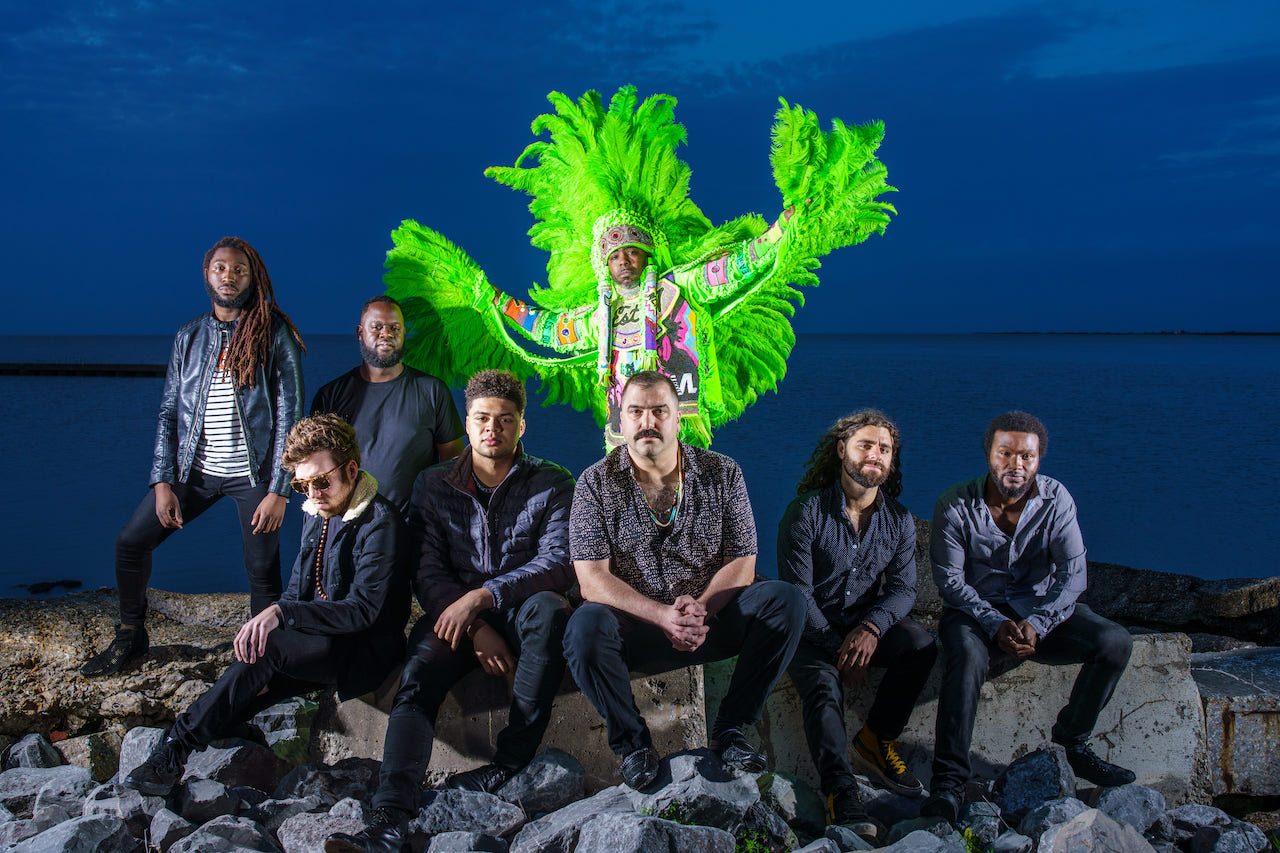Spotlight: Cha Wa

Drummer Joe Gelini still has to pinch himself when he thinks about playing in Cha Wa, despite the fact that he was a founding member of the upstart New Orleans act.
“If I was playing drums with The Rolling Stones, I wouldn’t be as excited about it as what I’m doing here,” he explains. “It’s not hyperbole; this is my dream come true.”
Meanwhile, for frontman Second Chief Joseph Boudreaux, Jr. and trumpeter Aurelien Barnes, performing in a New Orleans band is less of a dream than a destiny. Boudreaux, Jr. is the son of Big Chief Monk Boudreaux and has been participating in New Orleans music since he was a young child. Barnes is the son of Bruce “Sunpie” Barnes, a musician and educator who is Second Chief of the North Side Skull and Bone Gang, among the oldest carnival groups in New Orleans. “Their pedigree precedes them,” Gelini notes.
Formed in 2014, Cha Wa has now released three studio records; their most recent record, My People came out in early April. Considering that the membership of the band is drenched in New Orleans tradition, it isn’t surprising the band has been heavily influenced by some of the Crescent City’s most cherished musical ambassadors. However, for My People, the band intentionally wanted to create a new strain of their native sound.
“If you stretch the album, you will notice that we might take one traditional New Orleans sound and mix it with another traditional New Orleans sound and then add our own originality on top of that,” Boudreaux says. “So while we might come up with this completely different, original sound, we are still staying true to the root of it all.”
“We wanted to try and include almost all original songs on this record, while still saying to ourselves: ‘Let’s do something based off of this tradition that we have, but let’s not limit ourselves to what’s been done before,’” Barnes adds. “So, obviously, there’s going be elements of all kinds of different parts of New Orleans culture and music in there. But in a certain aspect, it’s like we’re mixing everything together because some songs could stand alone as a traditional Mardi Gras Indian song or as a rock/funk kind of thing. “Whatever genre it is, you decide what you want it to sound like.”
Despite the fact that Cha Wa is clearly breaking new ground on their latest record, the members still see My People as more of a jumping off point than a culmination.
“I don’t think it’s the apex,” Boudreaux notes. “I believe that we got a lot more—the next album I’m anticipating is gonna sound even more wilder than this one. It’s an elevation. The musicians in the band were able to spread their wings and do what they’re great at. Every individual in the band— and I know people who say this all the time, but I can really say that—brings forth a level of professionalism in what they do. And again, I feel like we’re only scratching the surface with that part.”
Many songs on the record, such as single “Wildman,” are raucous and grooving in their feel; yet, elsewhere on the album, the band is also keen to express their anger with the current world and support the Black Lives Matter movement.
“In New Orleans, one of the ways that we get through hardship and get through frustration and stuff like that is through joyful music,” Boudreaux says of Cha Wa’s ability to express their clear social frustrations through some seriously upbeat, funky music. “On a Sunday, during normal times, you will see anybody and everybody out at the second line trying to dance and feel free, and feel freedom and have at least one joyful moment in their week—their whole week could have been completely like shit, you know. It is the one moment that we have to feel some joy and to get over some of our frustrations. And this dates back all the way to slavery times, when there were Black slaves in the city of New Orleans that were forced to work for no pay and treated terribly. Black people have been celebrating life in the face of hardship in New Orleans since the beginning of the founding of the city.
“As far as the Black Lives Matter movement, we’re going to talk about it, and we’re going to try to make a change. But at the same time, you can’t rain on my parade,” he continues. “We’re always going to want to come together and make music and be strong together and celebrate life together— celebrate what it is that we have to show that we can’t just be held down by whatever it is that you’re doing to us.




















